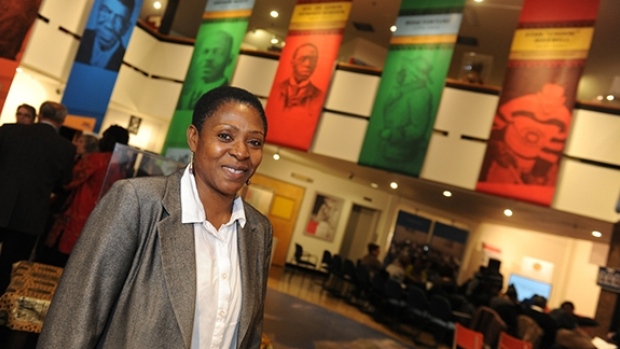América del Norte/Canadá/ Junio de 2016/Autor: Jon Tattrie/Fuente: CBC News
Afua Cooper stands by images of some of the great Canadians she’ll be teaching students about. (Courtesy Danny Abriel/Dal News)
RESUMEN: El profesor de la Universidad de Dalhousie, Afua Cooper, dice que el conocimiento nutre el ser humano y por lo tanto la historia del negro debe ser parte de la educación de todos los canadienses. «Lo que queremos es prestar atención a la sociedad africana-canadiense y la cultura desde el pasado hasta el presente», explica. Eso incluirá el estudio de los mecanismos de la esclavitud, el colonialismo, el racismo y la opresión estatal. Al comenzar con grandes temas, tales como la forma de construir una comunidad que pueda resistir a la opresión, el curso se ampliará en estudios de casos como Amber Valley, Alta., Salt Spring Island en aC, y Africville, N. S. Cooper lo llama «pan-africana, pero más pancanadiense.» «Vamos a hacer frente a la lucha de los negros por la justicia en todas sus formas», dice. «No es Doom-y-penumbra racismo y eso es todo lo que hay que hacer [También] estamos mirando a la resistencia, cómo las personas construyen sus vidas, cómo las personas han contribuido a la sociedad canadiense en todo tipo de campos -. Los derechos civiles, las artes , medios de comunicación, el mundo académico, las finanzas, los deportes, la medicina «.
There’s a «huge hole» in your education and Afua Cooper wants to help repair it.
The Dalhousie University professor became the James Robinson Johnston Chair in Black Canadian Studies in 2011, but soon noticed a problem.
«Dalhousie does not have a black studies program. I thought it was a bit of a paradox that we have a black studies chair, but not curriculum around black studies,» she told CBC News this week.
Cooper fixed that by spending a few years developing a new program. Starting this fall, Dalhousie students will be able to take an interdisciplinary minor in black and African diaspora studies.
«What we want to pay attention to is African-Canadian society and culture from the past to the present,» she explains.
That will include studying the mechanisms of slavery, colonialism, racism and state oppression.
Cooper says Canadians tend to «default» to the American experience and not think about what actually happens in Canada.
«That’s problematic because then we don’t know about Viola Desmond, we don’t know about Rocky Jones, [and] all the quotes we use are from Harriet Tubman and Martin Luther King,» she says.
• Is Viola Desmond really ‘Canada’s Rosa Parks’?
By starting with big themes, such as how to build a community that can resist oppression, the course will zoom in on case studies such as Amber Valley, Alta., Salt Spring Island in B.C., and Africville, N.S. Cooper calls it «pan-African, but more pan-Canadian.»
This 1929 class photo from Salt Spring Island’s Central School shows a degree of diversity that was impressive for the time. The community was home to one of B.C.’s most important black communities in the late 1800s. (Salt Spring Archives)
«We will address black people’s struggle for justice in all forms,» she says. «It’s not doom-and-gloom racism and that’s all there is to it. We’re [also] looking at resistance, how people build their lives, how people contributed to Canadian society in all kinds of fields — civil rights, the arts, media, academia, finance, sports, medicine.»
Cooper says knowledge nurtures humans and therefore black history should be part of every Canadian’s education.
For example James Robinson Johnston — whom her position honours — was barred from attending Nova Scotia public schools because he was black. Despite that, he got an education and in 1898 became the first black Nova Scotian to graduate from university.
‘Huge chunks’ of education missing
«Research has shown that when students come from a strong cultural background, or know about their heritage and are proud of their heritage, that they do much better. They have the confidence that’s required to be a good scholar and they do much better in school,» Cooper says.
«I see black students getting this knowledge as a kind of reparations, in the sense that black students often know very little, if anything, about their heritage.»
And white Canadians usually know even less.
«They can understand more about their own society. They can have an understanding of why part of their education is missing — like huge chunks of their education are not there — and have a better appreciation of the multicultural stories that make up the grand Canadian story.»
Cooper hopes the minor eventually grows to become a major offered at Dalhousie University.
Fuente: http://www.cbc.ca/news/canada/nova-scotia/dalhousie-black-and-african-diaspora-studies-starts-fall-2016-1.3644910







 Users Today : 41
Users Today : 41 Total Users : 35460058
Total Users : 35460058 Views Today : 57
Views Today : 57 Total views : 3418688
Total views : 3418688